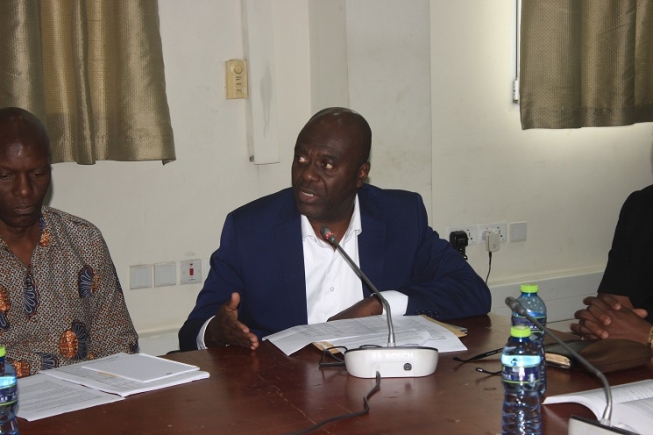
Graphic doesn’t enjoy government subvention - Director of Finance tells PAC
The Graphic Communications Group Limited (GCGL), the biggest state-owned media outlet, operates without any government subvention, the company’s Director of Finance and Administration, Samuel Essel, has told the Public Accounts Committee (PAC) of Parliament.
Advertisement
He said although the government had a 100 per cent ownership of the 73-year-old company, established in 1950, the company generated its own revenue to finance its operations.
“Honourable Chairman, no, we don’t enjoy any government subvention as we run everything from our own funds that we generate from operations,” he said.
Appearance
Mr Essel made the revelation when he, in the company of top management of the GCGL, appeared before PAC last Friday to respond to some issues raised in the 2021 Auditor-General’s report on the company.
The other members were the Managing Director, Ato Afful, and the Audit Manager, Lionel Fearon, who were there under the auspices of the Minister of Information, Kojo Oppong Nkrumah.
During the engagement, the Chairman of the PAC, Dr James Klutse Avedzi, asked if the GCGL was on government subvention and if the government had ever given the company any support in the form of loan to buy equipment and other items.
“What is the shareholding of government in the company? Is it 100 per cent?” the chairman asked.
Headwinds
The GCGL closed the 2020 financial year with a loss of GH¢1.94 million compared with a profit of GH¢1.41 million in 2019, representing a dip of 238 per cent in the financial performance of the group.
Based on this performance, a member of the committee, Akwasi Konadu, asked the management to provide answers for what drove profitability down to a negative figure.
Responding, Mr Essel told the committee that not only did the cost of sales go down, but “everything went down”.
He said the COVID-19 pandemic of 2020 made things very difficult for the company.
“Our sales suffered and we still have to keep our employees and a couple of other things; the pandemic really affected us for which reason we had a drop in both revenue and profit,” he said.
When the Chairman of the PAC asked if the GCGL was a company limited by guarantee or by shares, Mr Essel said the company was limited by shares.

Tax penalty
A member of the committee cited the A-G’s report on the infraction that the Group paid GH¢52,148 as penalty for delayed payment of taxes to the Ghana Revenue Authority (GRA), with the auditors recommending that the officer whose action or inaction occasioned the delay should be made to personally bear the cost of the surcharge.
He, therefore, asked if the company had complied with that.
Mr Essel pointed out that the said officer had not been charged due to the cause for which the delay happened.
He explained that the company had cash flow challenges due to the pandemic as a result of which no individual could be singled out as being responsible.
“It was a companywide issue as opposed to an individual’s action leading to that particular action,” Mr Essel explained.
Locked-up Investment
A member of the committee, Kofi Adams, also made reference to the GH¢135,227 investment the company made with Gold Coast Securities between June 15, 2017 and June 16, 2018 to earn an interest of GH¢19,901, with a maturity value of GH¢155,128.
He, therefore, asked if the management of the company had been able to execute the A-G’s recommendation for them to retrieve the accrued loss of GH¢155,128 into the accounts of the company.
Answering, the Director Finance said the management had been able to retrieve GH¢50,000.
He said the amount invested was not money “we picked from the company’s account” to invest in Gold Coast Securities (GCS).
Mr Essel explained that in the 1990s, GCGL bought shares of Ashanti Gold Fields but at the time when the gold mining company was taken over, the money was meant to come back to the GCGL.
“But the board of the GCGL then advised that rather than paying the money to GCGL, the money should be invested with Gold Coast Securities (SEC), who were the transaction advisors, to yield some returns.”
“After GCS went down, we filed our case with the Securities and Exchange Commission and we have so far retrieved GH¢50,000 of the money, he stated.
“The latest information that we have on this, as a result of our follow-up, is that GCS and SEC are in court and the next adjourned date will be on July 26, 2023 after which we will receive an update on where we are and the way forward on this transaction,” Mr Essel said.
Auctions
On the question on auction of the company’s vehicles without ministerial approval and the recommendation for management to seek retrospective approval from the Ministers of Finance and Information, Mr Essel said the company had implemented the Attorney-General’s recommendation.
He said management wrote to the ministries of Finance and Information in September last year to rectify the approval.
“We are yet to receive a response from them and we are still following up to get a response,” Mr Essel said.
Barter agreement
Another issue that came up was GCGL management entering into barter agreements to procure vehicles and other items, worth GH¢849,335, single source transactions that the A-G said were executed without approval from the Public Procurement Authority (PPA) and as a consequence the company’s management must be sanctioned.
But speaking to that, the Director of Finance said for a number of years, management had a challenge with the interpretation of whether or not the GCGL was subject to the PPA law since it was a limited liability company and did not enjoy any government subvention.
In spite of that, Mr Essel said the company went through a process to have the barter agreement approved by its board of directors as required by the company’s code.
“However, we did some consultation and it was agreed that we should just go and get registered and be approved by the PPA and operate under the authority so that we avoid this issue going forward and we have done that,” he said.




